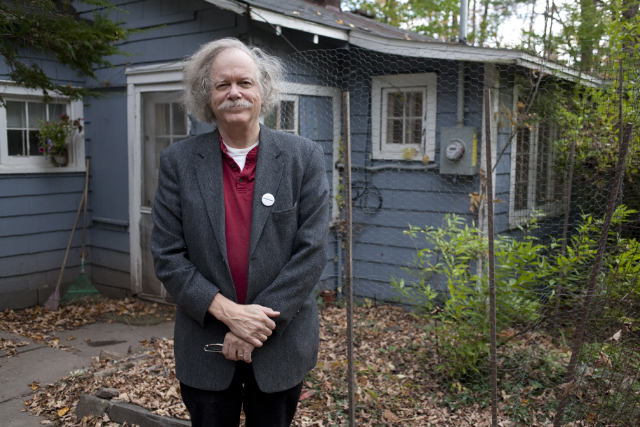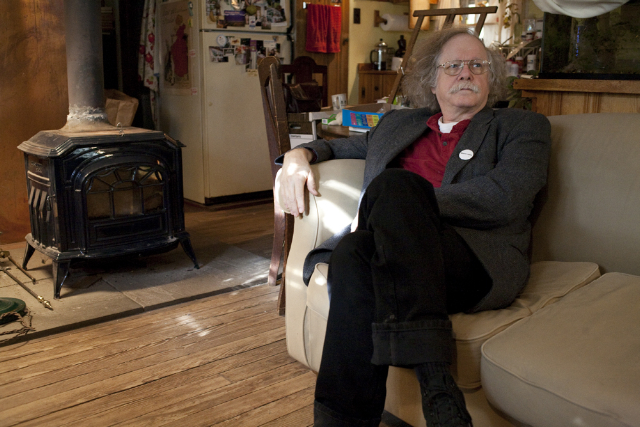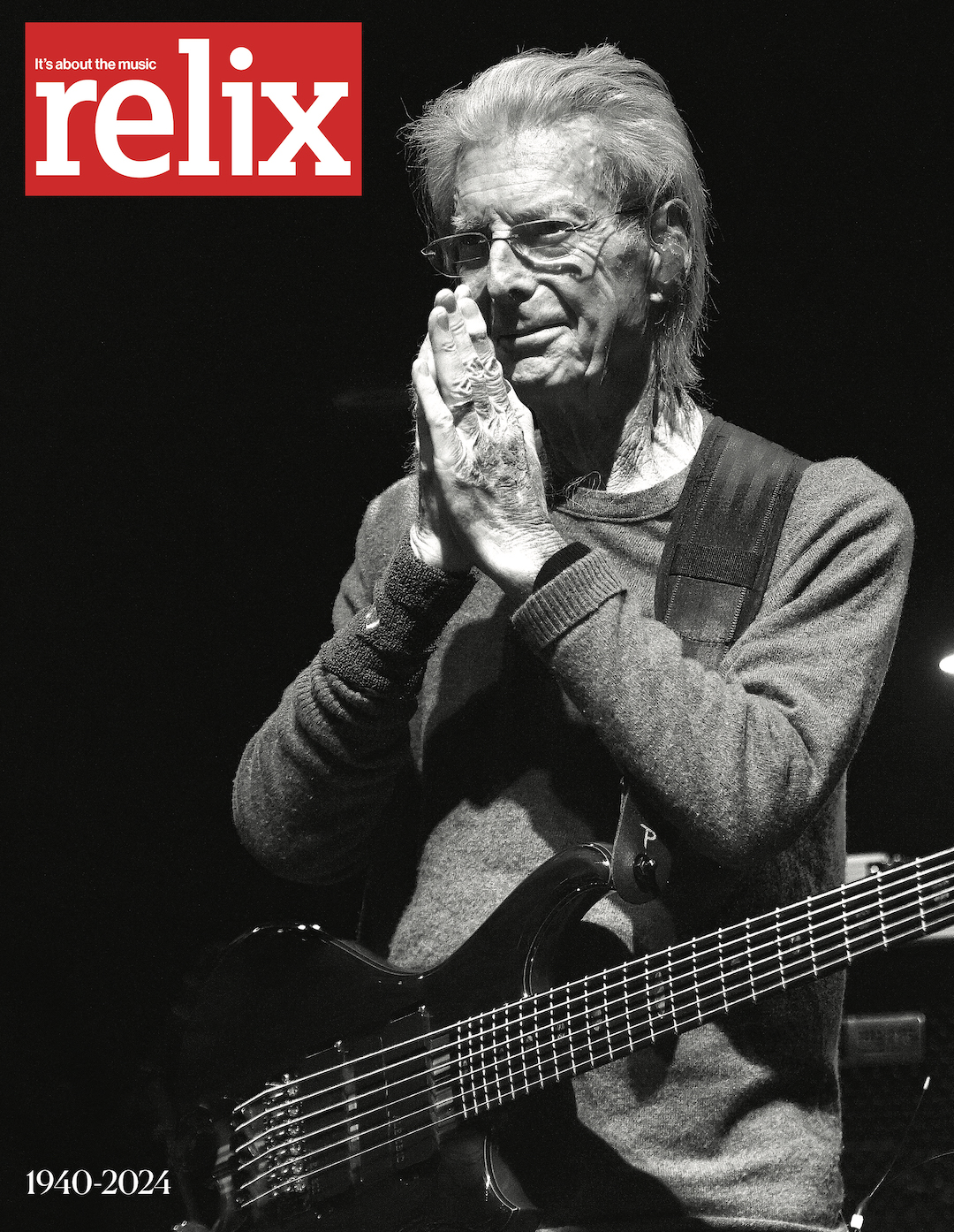The Fugs: American Peace-Creeps

“I still have a mimeograph machine,” Ed Sanders chuckles. “It’s out in my writing studio.” He sits in the cozy Woodstock home he shares with his wife of nearly 50 years, Miriam, amid ambiently humming fishtanks, chirping cockatoos, and many, many books. “If the power grid collapses and the fascists make their move, I can get leaflets out real quick.” At 70, his bushy hair remains combed raucously to the side.
Sanders – who wears a blazer, black jeans, and black Converse All-Stars – knows of what he speaks. As the co-founder of the Fugs, with Tuli Kupferberg, the ‘60s premier William Blake-loving politico-surrealist folk-bards, Sanders was a key connector in the counterculture, assigned his own plainclothes Federal surveillance agents during the riotous Democratic Convention of 1968. The previous year, the Fugs had exorcised – and attempted to levitate – the Pentagon during a massive war protest, chanting “Out, Demons, Out!” Self-publishing his radical proto-hippie journal, Fuck You/ A Magazine of the Arts ( “I thought it was a grabby title” ), which featured contributions from Allen Ginsberg and Andy Warhol, Sanders ran the Peace Eye Bookstore on New York’s Lower East Side, weathering obscenity busts and break-ins from junkies.
“The night before our world premiere, they stole our equipment. Our drummer played on a Krasdale peach box,” Sanders remembers, his mustache hinting at a smile. Some of the Fugs’ first gig, at the Peace Eye Bookstore’s February 1965 opening, is featured on a new digital album, Live From the ‘60s, self-released by Fugs Records. The peach box sounds pretty good.
Sanders leans back into the couch. The house overflows with texts, a living room table dedicated solely to science magazines. In one corner, Sanders has a work nook. Miriam paints at the kitchen table, near the stand-alone fireplace. Sanders is on break from another deadline, this one for a memoir, to be published by Da Capo in 2010. Coffee House issued Let’s Not Keep Fighting the Trojan War: New and Selected Poems, 1986-2008 in the fall. On his blazer is a Yoko Ono pin. “Peace,” it says simply.
“You ask about my philosophy, baby, yeah?” Sanders and company sang on 1966’s “Group Grope.” “Dope, peace, magic gods in the tree trunks, and GROUP GROPE, BABY!”
Using poetry as a source of strength, the Fugs’ music resonated with a still-righteous righteousness. In Armies of the Night, Norman Mailer’s Pulitzer-winning novel-as-history-as-narcissistic-memoir of the Pentagon protest, the Fugs are among the few to go unscathed. There was, and remains, authentic dignity in Fugdom. “Refuse to be burnt out,” they sang on the title song of their 1984 reunion album.
Now preparing to release their eighth album in their latter-day incarnation, the 45-year old folk-punks were scribed into history before they were even Fugs, when Sanders’ future conspirator, Tuli Kupferberg, appeared in Allen Ginsberg’s Howl ( “who jumped off the Brooklyn Bridge this actually happened and walked away unknown and forgotten” ). Already 41 at the Fugs’ 1964 founding, Kupferberg was the author of 1961’s infamous 1,001 Ways to Live Without Working. Now 86, he has recently hosted his Revolting News show on Manhattan cable.
In the late summer, recovering his eyesight from an April 2009 stroke, Kupferberg experienced a second one. “He had just given an hour-long lecture on Marx and Engels to one of his nurses,” notes Sanders. With Hal Willner, Sanders is organizing a benefit for Kupferberg’s medical expenses, but acknowledges the grim probability of the new disc’s title, Be Free! (The Fugs’ Final CD, part II), to be released in February.
The disc, Sanders says, espouses “our longtime anarcho-socialist/center-left/libertarian/Kropotkinian worldview.” Like their 1965 debut, it contains a setting of a William Blake poem to music. Not to mention a few of Sanders’ home-built instruments, including the Microlyre.
Perhaps Sanders’ most important work of recent years, though, is his epic nine-volume America: A History in Verse. With the first three volumes published in elegant print editions by Black Sparrow Press, and an omnibus CD from Blake Route Press containing the first five (1900-2000), the milestone composition attempts to “trace with grace / what the Fates & Human Mammals have wrought / in the Time-Track of the USA.”
Though Sanders notes that he can “use the phrase ‘right-wing nut’ on every page if I want,” he doesn’t. Usually they’re “military-industrial-surrealists.” America is built and fact-checked from hundreds of clippings-filled bankers’ boxes and shelves of history books overtaking Sanders’ writing studio. He can only write in the house now.
“I always was a pack rat and a collector and kept a lot of files,” he says. “I learned that from Allen Ginsberg. He was also a Jack the Clipper. He started cutting out clips in the 1930s during the Spanish Civil War and then during the rise of Hitler, on Kristallnacht, and the Fifth Column. He told me to clip, clip, clip, and I always did.” He points out another stash of filing cabinets in the garage. Each box is labeled in Sanders’ spiraling spider-crawl, hinting at the hieroglyphics he taught himself at the Metropolitan Museum of Art while studying Greek and Latin at NYU.
It is a method Sanders refined while researching his classic best-selling exposé on Charles Manson, The Family, first published in 1971, a process which also involved him posing as “a New York pornography dealer with Andy Warhol out-takes” and a “dope-tranced psychopath” in order to get information. He became a “data addict.”
“I encourage people to use America as a data resource from my left-liberal perspective,” he says. “I point out new things each year and look for art and poetry and try to cover, naturally, the struggle of peace forces – there are always peace forces – against the forces of war. It’s a classic battle in the United States, going back to the War of 1812, or the battles against the Native Americans.”
They are forces Sanders himself has marshalled, both as a Fug (say, exorcising Joseph McCarthy’s grave with Ginsberg in 1968) and beyond (as in his 1975 manifesto, Investigative Poetry, to “bring down into the vale of Ha Ha Hee/ the North American CIA Police State” ).
“I am a poet, songwriter, leader of a rock and roll band, publisher, editor, recording artist, peace-creep,” Sanders testified in the 1969 Chicago Seven trial.
The prosecution interrupted. “What was the last one please?”
“Will you spell it for the reporter?” the Judge asked.
“P-E-A-C-E,” Sanders said. “Hyphen, C-R-E-E-P. And a yodeler,” he added.
The court would not let him demonstrate. “I’m still very upset with [the judge],” he says. “I’m the only Beatnik who can yodel, and he thwarted my chance to exercise my skill.”




















